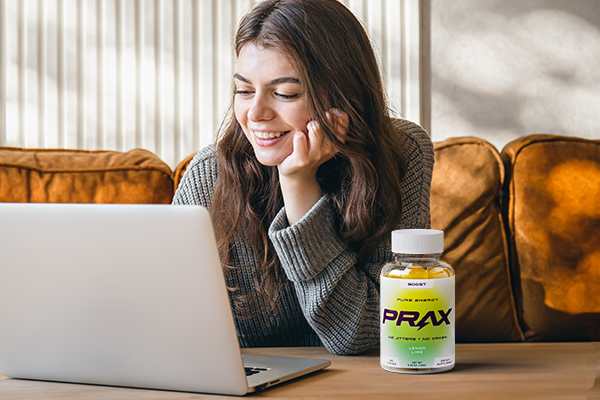
Does Paraxanthine Keep You Awake? Tips About Paraxanthine and Sleep
Paraxanthine has gained attention as a next-generation energy ingredient. And for good reason. Paraxanthine offers clean focus, smooth energy, and fewer side effects than caffeine.
But many first-time users have an important question: Does paraxanthine keep you awake?
The short answer: It can. But it's far less likely to disrupt your sleep than caffeine.
Thanks to its shorter half-life, cleaner metabolic profile, and gentler stimulation, paraxanthine gives you the energy you want without staying in your system all night.
In this article, we’ll break down how paraxanthine works, when to take it, and how it compares to caffeine when it comes to rest, recovery, and bedtime.

What is Paraxanthine and How Does it Work?
Paraxanthine is a naturally occurring compound and the primary metabolite of caffeine, responsible for most of caffeine’s cognitive and performance-enhancing benefits.
When you drink a cup of coffee, about 80% of that caffeine is converted into paraxanthine in your liver.
Unlike caffeine, paraxanthine doesn’t metabolize into compounds like theobromine or theophylline, which are often linked to jitters, overstimulation, or lingering energy late into the evening.
Instead, pure paraxanthine provides a clean, focused boost, blocking adenosine receptors to enhance alertness, but with a smoother onset and shorter duration.
Paraxanthine Has a Shorter Half-Life Than Caffeine
One of paraxanthine’s biggest sleep-friendly benefits is its half-life. According to early research, paraxanthine has a half life of around 3.1 hours. That’s compared to the other compounds in caffeine which can last between 4.5-6 hours.
That means paraxanthine clears from your system more quickly, so you're less likely to feel wired at bedtime if you take it in the afternoon.
“Paraxanthine has about a 25% shorter half-life than caffeine,” notes one researcher. “That means you can take it later in the day and it won’t affect your sleep quality the way a late cup of coffee might.” SOURCE
Learn more about the half-life of paraxanthine in our guide.

Can Paraxanthine Still Affect Sleep?
Yes, any stimulant can impact sleep if taken too close to bedtime. If you’re someone who is especially sensitive to caffeine or other xanthine-based compounds, definitely use caution with your timing.
But with that said, paraxanthine’s shorter duration makes it MUCH more flexible than other caffeinated options. For example, if you’ve been relying on coffee or a caffeine-packed energy drink in the afternoons, but then struggle to turn your brain off in the evenings, paraxanthine could be the right choice for you.
Here are some signs that paraxanthine might be affecting your sleep:
-
Difficulty falling asleep if taken after 4-5 PM
-
Feeling mentally “locked on” in the evening
-
Light or restless sleep
If you experience this, don’t give up. Simply adjust your timing or dosage. Many users find that a single PRAX gummy (100–150 mg) earlier in the day provides all the clarity they need, with none of the sleep trade-offs.
What If You’re Sensitive to Stimulants?
Even though paraxanthine is generally better tolerated than caffeine, people who are highly sensitive to stimulants should still approach with some planning and extra attention.
Start Low and Time It Right
If you’re sensitive to caffeine or have experienced side effects in the past, we highly suggest starting with a lower dose, such as half a PRAX gummy (50–75 mg)
Take paraxanthine earlier in the day, ideally before 3 PM, to ensure it clears from your system well before bedtime.
If you tolerate it well in the afternoon, experiment with different dosages and timings to see how it affects your sleep.
Monitor How You Feel
Some users may still feel mentally alert later in the day if they take too much or try a dose too late. If you notice any significant sleep disturbances, reduce your dosage or shift your timing to earlier in the day.
Choose a Clean, Predictable Product
PRAX gummies are pre-measured and use a trusted paraxathine provider, so you know exactly how much paraxanthine you’re getting. That consistency makes it easier to find the dosage and routine that works best for your body.

Frequently Asked Questions on Paraxanthine and Sleep
Will paraxanthine keep me awake if I take it after dinner?
Possibly. While paraxanthine clears more quickly than caffeine, it still acts on the central nervous system. For most people, taking it in the late afternoon or evening is not recommended, especially within 5-6 hours of bedtime.
Head on over to our guide on paraxanthine for sleep to learn more.
Can paraxanthine be used as a late-day pre-workout?
Yes—but with caution. If you're working out in the early evening and want a clean energy boost, paraxanthine may work well. Just be mindful of your bedtime and start with a low dose (100 mg or less) to test your sensitivity.
Here's a complete guide to using paraxanthine as a pre-workout supplement.
Is paraxanthine better for sleep than caffeine?
Generally, yes. Because it doesn’t linger in the body as long, and doesn’t break down into overstimulating compounds like theobromine, paraxanthine is often better tolerated—especially for those who are caffeine-sensitive or trying to avoid nighttime stimulation.
Check out our guide to paraxanthine vs caffeine for more.
How late in the day is too late to take paraxanthine?
Most users should avoid taking paraxanthine after 3 PM, especially if they plan to go to bed before 10 or 11 PM. Those with slower metabolisms may want to stop even earlier.
Wondering about paraxanthine timing and dosage? We've got that covered, too.
What are you waiting for?
Give our clean energy paraxanthine gummies a try today!




